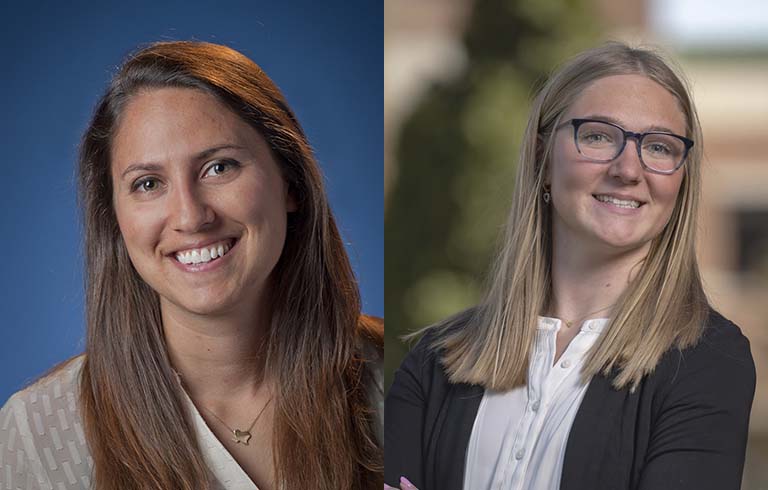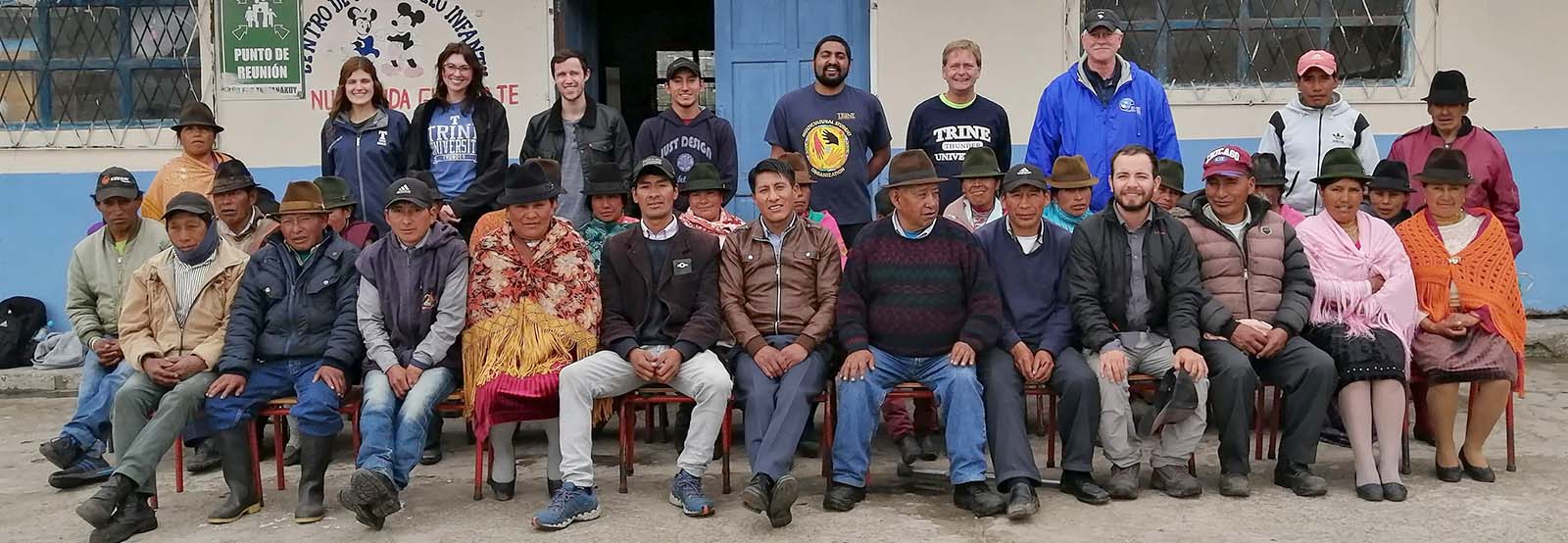
Two from Trine named to Forty Under 40
A Trine University administrator and a graduating senior are included in this year’s Greater Fort Wayne Business Weekly Forty Under 40.
April 08, 2020

Since 2017, teams including members from Trine University’s Engineers Without Borders (EWB) chapter have assessed the water needs of a remote Ecuadorian village and surveyed the area for additional sources.
In March, work began on improvements to the village’s water system.
Four Trine students traveled with Tim Tyler, Ph.D., professor in the Reiners Department of Civil and Environmental Engineering, and an engineer from the Indy Professional Chapter of EWB to Comuna Guangaje from March 1-8 during spring break.
The trip, the third to the area by teams of Trine students, had been postponed from the fall due to civil unrest in Ecuador resulting from a transportation strike, and, fortunately, was able to be completed before the novel coronavirus outbreak limited travel.
Sandeeb Kurian, a design engineering technology major from Elkhart, Indiana, said he has been part of EWB for nearly three years and was excited to become more tangibly involved with the project.
“After working on the paper side of the project for so long, I wanted to go and see the beautiful country, meet the wonderful people of the Guangaje community that I had heard so much about, and volunteer my time to help the community in person,” he said.
Alex Plastow, a biomedical engineering major from Warsaw, Indiana, said he took part in the trip because he has a passion for Latin American language and culture.
“Any time I can get an excuse to travel to Latin America, I will,” he said.
“Ever since I was in high school, I have wanted to join the Peace Corps. As I was attending college visits, I toured Trine and heard about our chapter of Engineers Without Borders,” said Ashton Benson, a civil engineering major from Delaware, Ohio. In that moment, I knew not only where I wanted to go to school, but what student organization I wanted to be a part of. Being able to provide a basic need for an entire community is not only gratifying, but extremely inspiring.”
Kurian said he was struck by the friendliness of the people in the village as the group arrived. Plastow said the needs of those living there became apparent shortly.
“I sat down with a little girl with visibly dried cheeks,” he said. “Comuna Guangaje has a genuine need.”
That need was reinforced for Benson when an interpreter shared with the group graphs that showed about half of the children in the village are at serious risk for malnourishment.
“It resonated with me why our work with the community is so necessary,” she said.
During the trip, the group worked with the community of about 400 indigenous people, mostly poor farmers, to excavate two 100-foot-long trenches about 4-5 feet deep to collect spring water. The trenches were lined with geotextile fabric to keep the soil out, and gravel and a 4-inch perforated pipe were installed to collect the water.
“I was a bit like an additional translator, but it became harder to use when Spanish was mixed with Quechua,” Plastow said. “Otherwise, I'm a pretty muscular dude. I moved some boulders out of the trench the community was digging. The locals would start laughing when I tried digging, because I looked like a man who had never touched a shovel in my life, and my compadres worked like machines. I also was assigned to test the water for hydrogen sulfide-producing bacteria.”
“With the altitude and feeling a little under the weather, I couldn’t help much physically with the construction of the French drain, but I did ensure the plans were being followed,” said Benson. “Once we got the depth and shape of our trench, and the sand, gravel and pipe were laid, I capped off the ends to prevent sediment from entering the pipes.”
“There were two different springs, so everyone was broken into two teams to work on each site,” said Kurian. “Dr. Tyler was in charge of my team, and our responsibilities involved completing anything delegated by Dr. Tyler and to assist the villagers on site in any way possible.”
The pipe flowed by gravity to an existing concrete box, then the water flowed by gravity from the mountains to the village below.
“These new collectors performed fairly well,” said Tyler. “One of them in particular doubled the capacity of the inflow.”
Plastow said the villagers thanked the group by dancing and serving some local food.
“Guinea pig does not taste that bad,” he commented.
“What I will remember most about the trip is the people. Despite some language barriers, I was able to meet and foster great relationships,” Kurian said. “Being able to put in the physical work and see the real difference that it made for the community as well as how happy the people were as a result was truly rewarding; like nothing else I have ever experienced.”
“I will never forget the amazing people I met,” Benson agreed. “Sitting down at dinner with our interpreters and getting to know them along with my fellow classmates is an incomparable experience.”
This trip was made possible through donations from Trine University and faculty, staff, current students and alumni, as well as the Auburn Rotary Club and Mad Anthony’s.
Additional work is still needed, Tyler said, and another trip is planned for Spring 2021.
Top photo: A team including Tim Tyler, Ph.D., professor in the Reiners Department of Civil and Environmental Engineering, and four Trine University students stands with villagers from Comuna Guangaje in Ecuador. The group traveled to the village March 1-8 to begin making improvements to the village’s water system.